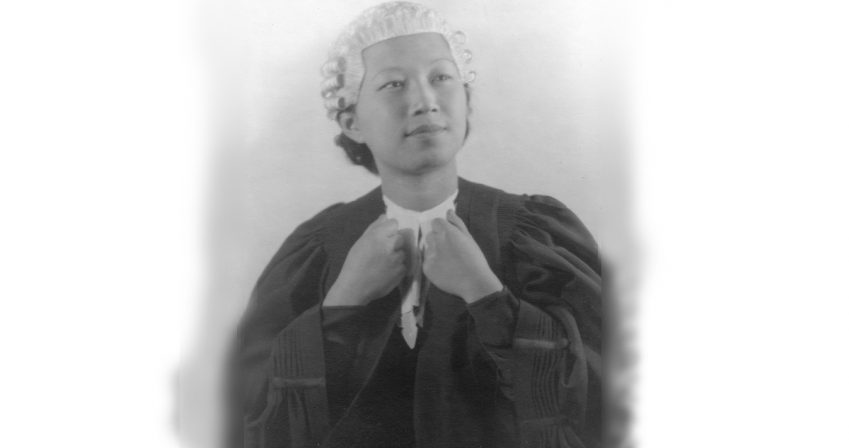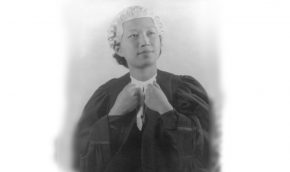First woman in Jamaica to be called to the Bar.
Celebrating Diversity at the Bar
- Introduction
- Diversity Timeline
- Edward Akufo-Addo
- Obafemi Awolowo
- Joyce Bamford-Addo
- Solomon Brandaranaike
- Charlotte Boaitey-Kwarteng
- Joseph Ephraim Casely Hayford
- Eugenia Charles
- S Chelvan
- Thomas Morris Chester
- Learie Constantine
- Edward Cragg Haynes
- Patricia Dangor
- Coomee Rustom Dantra
- Ezlynn Deraniyagala
- Gifty Edila
- Taslim Olawale Elias
- Martin Forde
- Arthur Dion Hanna
- Ma Pwa Hmee
- Alexander Isbister
- Sibghatullah Kadri
- Seretse Kharma
- Moleleki Didwell Mokama
- Tunde Okewale
- Ashitey Ollennu
- Vallabhbhai Patel
- Lily Tie Ten Quee
- Ponnambalam Ramanathan
- Edward Richards
- Khushwant Singh
- Manjiit Singh Gill
- Teo Soon Kim
- Leslie Thomas
- Stella Thomas
- Leonard Woodley
Home › Celebrating Diversity at the Bar › Lily Tie Ten Quee
Lily Tie Ten Quee
Lily Tie Ten Quee, was the daughter of a successful Chinese businessman in Jamaica who had emigrated to the island from China at the turn of the 20th century. Her father was the first Chinese magistrate on the island, her uncle was the first Chinese solicitor and her brother also became a solicitor.
An alumnus of Newnham College, Cambridge, at a time when women were not recognised as ‘full members’ of the university and only given ‘title of a degree’ and could not go to Senate House to receive the degree in person. None the less she graduated, and in 1933 and became Jamaica’s first woman to be called to the Bar. Even in Britain, there were relatively few women barristers, and only one other woman was called on the same day. Lily Tie Ten Quee recalls that at the formal students’ dinners in Middle Temple Hall, male and female diners were kept apart and as she was often the only woman there, this meant she dined as she put it in ‘solitary splendour’.


Lenli Tie Ten Quee
When Lily became a barrister, there was a huge celebration in Jamaica to mark the occasion and her father hoped that she would join the family firm of lawyers. However, she wanted to re-connect with her Chinese roots and at a reception in Kingston in 1934, she publicly declared her intention to dedicate her life to the development of China as a modern country. That same year, she went to Nanking, then the capital of China under the Nationalist government of Chiang-Kai-Shek and was given a job at the Central Political Institute (CPI), that had Chiang-Kai-Shek as its president, to teach jurisprudence and English literature. The CPI was a training college for graduates of other universities and trained diplomats and magistrates.
But history thwarted her plans to stay in China. She found herself obliged to return to Britain in 1936, just ahead of the Nanking massacre when an estimated 150,000-300,000 people were executed, and thousands of women raped by the invading Japanese forces.
She married the Cambridge University jurist and legal scholar Richard Meredith Jackson (The Machinery of Justice in England which is still in print today) later that year.
During the Second World War, she worked in the legal department of the Ministry of Supply. After the war, she made annual visits to Jamaica to visit her mother but she continued to live in Cambridge until her death in 1991. She offered hospitality to a great number of Chinese students at Cambridge University. Among her many activities, she worked at the Legal Advice Centre that was run by Cambridge’s Citizens Advice Bureau. She had a son, Shean and a daughter, Mei-Ling. Shean read for the Bar but decided to go and live in Jamaica where he was killed in a road accident in 1968.